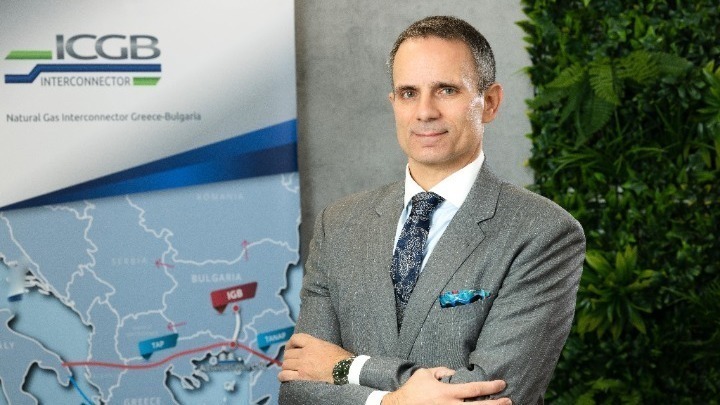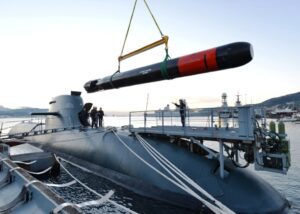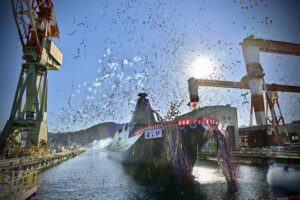The Greece-Bulgaria interconnecter (IGB) will be a game-changer in the energy market, George Satlas, executive officer and board member of ICGB AD, the manager and commercial operator of the natural gas pipeline, tells Athens-Macedonia News Agency in an interview.
Satlas reveals that the IBG pipeline’s capacity expansion from 3 bcm/year to 5 bcm/year is dependent on market tests, one of which is scheduled for the second half of this year. The company is working on a viable plan toward this, he adds.
In his interview to ANA-MPA, he refers to the benefits IGB will garner from the completion and operation of the Floating Storage Regasification Unit (FSRU) in Alexandroupolis, which may also contribute to raising the volume of gas supply for IGB. He underlines that ICGB AD is open to the prospect of transporting hydrogen through the pipeline, but details can only be provided after careful and in-depth analysis, while in the interview he also outlines the priorities ICGB has set for the immediate future.
The full interview follows below:
Q: Since the launch of IGB everyone has been talking of a game-changer for the gas market in Europe. Could you provide us with some numbers and/or agreements signed that justify this assessment?
The interconnector Greece Bulgaria (IGB) is considered a game-changer in the area for several reasons, beyond numbers. It caters to diversification of energy sources by providing an alternative route for natural gas supplies to Bulgaria and other Southeast European countries. The pipeline essentially allows these countries to reduce their dependence on a single gas supplier and diversify their energy sources. Prior to the construction of the IGB, Bulgaria relied heavily on natural gas imports from Russia, which made it vulnerable to potential disruptions in the supply, and this is something we witnessed firsthand. In the new, changed security environment energy independence and security through new and better interconnected infrastructure are more crucial than ever. In that aspect, IGB’s launch was of immense importance well beyond the national borders of Greece and Bulgaria alone.
Since its launch on October 1, 2022, over 1 billion cubic meters (bcm) have been transported through the interconnector, making it the number one source for natural gas import in Bulgaria. The pipeline is now covering almost 50% of the country’s internal consumption needs and at the same time allows for natural gas transport to other countries in the region – including Moldova and Ukraine, given its great synergy with the Trans-Balkan gas pipeline. This is invaluable support and just another key step in showing that a better connected and more united Europe can be stronger than destructive forces and aggression. In such a short period after the commercial start of the interconnector, we have more than 20 registered users and have seen enough market interest to even start considering expansion of the total capacity (currently 3 bcm/y). This is beyond what we expected as a new transmission operator entering the market in our first year.
Q: How are the plans to increase the pipeline’s capacity from 3 bcm/y to 5 bcm/y going? What are the expectations of the upcoming market test?
The technical possibility to upgrade IGB’s capacity to 5 bcm/y was part of the very initial plans for the project even before the construction phase of the pipeline. However, it was expected that this would become a major topic to explore at least after a few years of commercial operations, depending on the market’s development and interest. I think it’s safe to say that things changed drastically since those early days and the war in Ukraine increased the demand for new, safer routes for diversified deliveries. This is exactly what IGB is – a new gateway for natural gas from the Caspian region, including potential future supplies from Azerbaijan, Turkmenistan, etc. The interest we saw in the pipeline upon its launch was significant enough for ICGB to consider speeding up the expansion plans and we’re already actively discussing this opportunity with the Greek transmission system operator DESFA – they are also a vital part of this process. We’re looking at the option to expand the capacity in line with the planned launch of the LNG terminal in Alexandroupolis, since these infrastructures are so well connected. To move forward with such an investment, it is traditional and expected from a regulatory point to assess the market demand through a market test, determining whether there would be enough interest to support this.
The expectations for such tests include factors like the interest and participation of potential shippers, the volume of gas requested for transportation, the pricing mechanisms, and the overall market response. ICGB is currently working internally on a sustainable plan to increase the pipeline’s capacity to 5 bcm/y to satisfy forthcoming demand, but this should be substantiated by the relevant market tests. We plan on holding one in the second half of this year and I hope we can announce specific dates soon.
The process is a rather complex one and has to include analysis of multiple factors like market dynamics, feasibility studies, an engineering study, an environmental impact study, and a safety & risk assessment to evaluate the potential risks of such a step. It is essential to engage with relevant experts, engineering firms, regulatory authorities, and environmental consultants to ensure compliance with applicable regulations and industry best practices. As a transmission system operator, ICGB is devoted to carrying out all procedures in line with the best practices in the sector and I am confident that the market test results will not disappoint.
Q: If things go well and there is stability in the market, are there any thoughts to increase the pipeline’s capacity even further – above 5 bcm/y – in the future? And if yes, what would it take for such a move?
We’re all hopeful to see stability in the market and this can happen through mechanisms like developing new, interconnected infrastructure, meeting gas storage filling targets, enhanced regional cooperation, investing in greener energy sources etc. When it comes to IGB’s role, we have to be focused on the operational safety and development of the project to ensure all contracts are being met. The pipeline’s technical limits in the planning phase have been set to handle about 5 bcm/y, and reaching that number is the current target for the near future. If in time market demand shows the need for capacity beyond those numbers, this might happen through a second duplicate pipeline – but this is a conversation we can come back to in several years depending on how the market develops. For now, ICGB’s main goals are to provide secure, regular gas flow so that the competitiveness in the market can be felt by businesses and households alike, keeping the prices steady and accessible.
Q: The national grid operators of Bulgaria, Romania, Hungary and Slovakia signed a memorandum of understanding with Azerbaijan’s state-owned energy company SOCAR, through which their networks will guarantee the supply of further volumes of Caspian gas to Europe, under an EU agreement to double those shipments by 2027. What role could IGB play in that?
As less than a year ago, in July 2022, the EU and Azerbaijan signed an agreement to double supplies to Europe to 20 bcm/y by 2027, it is normal for countries of the South Gas Corridor to seek agreements that will support this cause. IGB plays a significant role in the context of the memorandum of understanding between the national grid operators of Bulgaria, Romania, Hungary, and Slovakia, along with Azerbaijan’s state-owned energy company SOCAR, and we would hope to also see Moldova and Greece joining. Adding Greece, the co-host country of the IGB pipeline, supports the crucial infrastructure link for the transportation of natural gas from Greece to Bulgaria. It enables the diversification of gas supplies to Bulgaria, reducing its dependence on a single supplier and enhancing energy security. IGB’s operation and connectivity with the gas networks of other countries involved in the MoU are vital for the realization of the increased Caspian gas shipments. Moreover, as Greece plays a broader role in the region being an energy hub by actively developing its energy infrastructure and promoting energy cooperation with neighboring countries, IGB is the strategic link to facilitate the transportation and distribution of natural gas to and from various sources, including the Caspian region. Its geographical location and state-of-the-art infrastructure make it a strategic gateway for energy flows into Southeast Europe.
I’d also like to highlight that the increased availability of Caspian gas and the broader regional cooperation can contribute to the operation of the interconnector. The pipeline can play a vital role in transporting the additional volumes of gas from the Caspian region to Bulgaria and potentially onward to other countries in the region. ICGB’s team will do everything necessary to ensure that the infrastructure and capacity of the interconnector are optimized to handle the increased gas flows efficiently, ensuring smooth operations and meeting the growing demand.
Q: The Alexandroupolis floating storage and regasification unit (FSRU) import terminal in the Aegean Sea offshore Greece goes live in 2024. How will IGB benefit from that and what are the synergy plans with other LNG terminals in the region?
Apart from the diversification of gas sources that the FSRU terminal in Alexandroupolis offers, it will enable Greece to import liquefied natural gas (LNG) from various global suppliers. The availability of LNG from different sources enhances the diversification of gas supplies for Greece and the wider region. This aligns with the objectives of the IGB, as the two projects have great synergy and are so close to one another.
The most profound benefit for IGB is that the Alexandroupolis FSRU terminal can contribute to increased gas supply for our pipeline. LNG received at the terminal can be regasified and transported through the IGB, providing an additional source of natural gas to Bulgaria and potentially other countries connected to the interconnector.
The integration of the Alexandroupolis FSRU and the IGB pipeline strengthens the overall energy infrastructure in the region and promotes market connectivity. It enables the transportation of LNG through the IGB, creating a link between global LNG markets and the Southeast European gas market. This connectivity can foster regional energy cooperation, improve supply options, and support the integration of gas markets in the region.
To mention the specific synergy plans with other LNG terminals in the region one should be aware that they will depend on commercial agreements, market developments, and the willingness of stakeholders to collaborate. The objective would be to optimize gas flows, promote regional gas trading, and establish a more interconnected and integrated gas market in Southeast Europe. Continued cooperation and coordination among relevant stakeholders, including infrastructure operators, market participants, and regulatory authorities, will be crucial in realizing the full potential of these synergies.
Q: Is there any assessment process underway regarding the pipeline’s infrastructure readiness to carry hydrogen as well? What are the plans in this field?
As technology related to exploitation of hydrogen accelerates, the option for transportation of hydrogen through the IGB is currently being assessed. We at ICGB have actively been following this topic and to stay ahead of the curve, we have already initiated the relevant evaluations and studies to determine whether hydrogen can be a part of the mix IGB transports and what that would mean in terms of investments in infrastructure.
Key considerations include the material compatibility of the pipeline, hydrogen purity requirements, and safety aspects. It is important to note that plans for hydrogen transport through the IGB or any other natural gas pipeline depend on a number of elements such as technological advancements, regulatory frameworks, market demand, and the development of hydrogen production and distribution networks. Currently IGB is exploring under market consultation a report assessing the potential readiness to transport mixtures of natural gas and hydrogen under current operating conditions. We are open to the possibility of hydrogen transportation through the pipeline, but the details can only be determined after careful and in-depth analysis.
Q: What are the next priorities of ICGB?
Since the project is now in operation phase, the main task ahead is the capacity increase from 3 bcm/y to 5 bcm/y. However, there are ongoing priorities for ICGB in fields like regulatory compliance, operational readiness, market development and capacity allocation and the enhancement of interconnectivity and regional integration.
Furthermore, keeping the infrastructure in operational readiness is crucial. It includes calibration of the appropriate management systems, processes, and protocols for pipeline maintenance, monitoring, and emergency response. Commercially wise, the ICGB team engages with potential shippers and customers, conducts market tests, and allocates pipeline capacity to interested parties. Building strong relationships with market participants and ensuring transparency and fair competition is crucial in this phase of development.
Day to day operational activities aside, ICGB’s management explores opportunities to enhance interconnectivity with other gas infrastructure projects in the region. This includes coordination with neighboring countries to improve gas flows, promote cross-border cooperation, and support regional energy integration. Collaborating with other pipelines, LNG terminals, and market operators in the region can contribute to the establishment of a more interconnected and integrated gas market and benefit the complete energy ecosystem in the area, a top priority for ICGB. Looking closer to home, we’re also cooperating with local licensed operators that are interested in connecting their networks to that of IGB, allowing access to diversified deliveries for regions along the pipeline’s route which didn’t have such opportunity before.
– Sophia Papadopoulou







